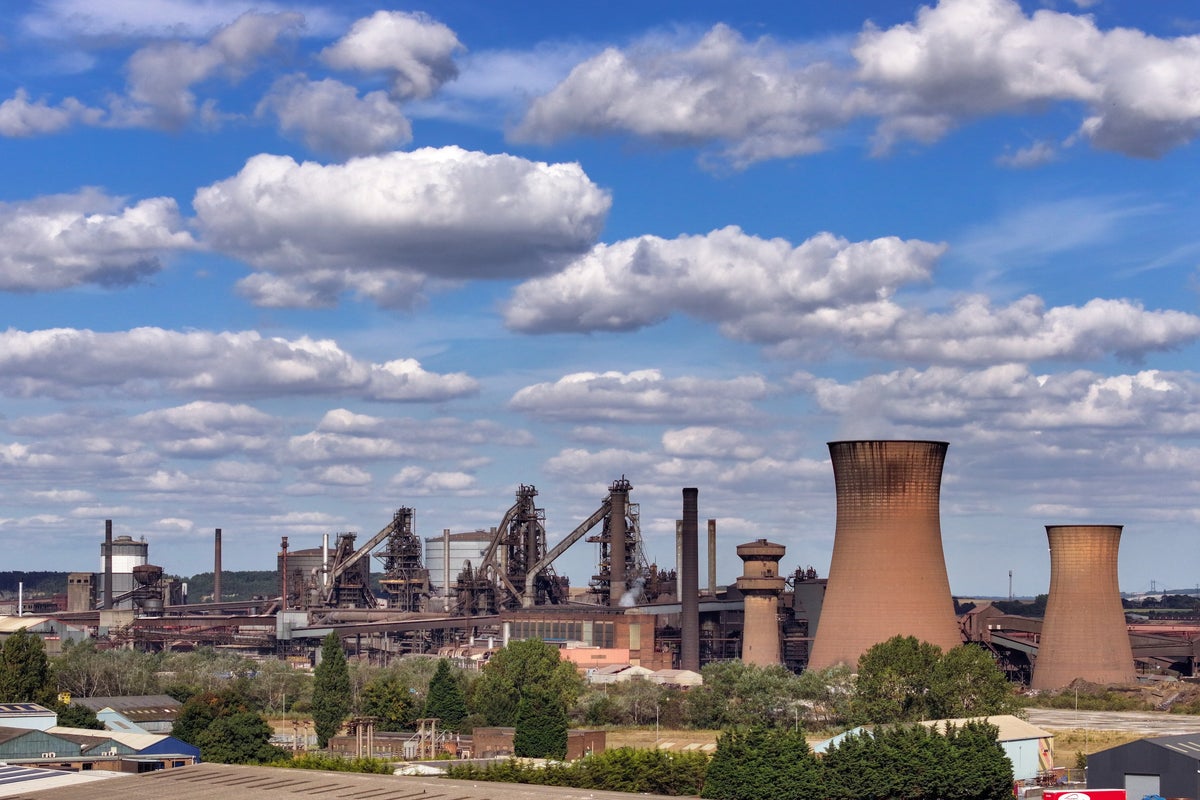More than 2,000 jobs at British Steel could be at risk after the company announced it is in talks over the possible closure of furnaces.
British Steel, the second-largest producer in the country, has launched a redundancy consultation on shutting two blast furnaces in Scunthorpe. More than half of the company’s 3,500-strong workforce could potentially be impacted.
The Independent understands the firm’s Chinese parent company Jingye rejected a £500m subsidy offer from the UK government on Wednesday, made by business and trade secretary Jonathan Reynolds in an attempt to aid the transition to producing green steel.
While talks remain ongoing, it is also understood there are currently no plans to increase the offer, which remains on the table should Jingye reconsider its position.
The steel industry was hit earlier this month by one of Donald Trump’s tariffs, which placed an additional 25 per cent cost on steel and aluminium imports and led to orders being cancelled.
Government data shows the steelmaking industry contributing £2.3bn to the UK economy in 2023, equivalent to 1 per cent of manufacturing output.
Reacting to Jingye’s rejection of the offer, Mr Reynolds said: “I know this will be a deeply worrying time for staff and, while this is British Steel’s decision, we will continue working tirelessly to reach an agreement with the company’s owners to secure its future and protect taxpayers’ money.
“We’ve been clear there’s a bright future for steelmaking in the UK. We’ve committed up to £2.5bn to rebuild the sector and will soon publish a plan for steel setting out how we can achieve a sustainable future for the workforce, industry and local communities.”
The Independent understands that along with rejecting the principal offer, Jingye has not necessarily agreed or met certain conditions the government were insisting on regarding working standards and local support.
Industry minister Sarah Jones told the business and trade select committee that they were “still in talks”, as the government continues to urge British Steel to reconsider its decision.
Ms Jones said: “It is regrettable that they have not yet done so, or accepted our offer. Therefore I call on the company to reconsider their plans to announce early closures, accept our conditions and accept our generous offer which remains on the table.
“I want to assure the House that we are working tirelessly to find a solution. We believe there is a bright future for steel making in the UK and we call on British Steel to work in partnership with a government that cares deeply about the steel sector, to put the business on a sustainable footing for the future and an end to the years of uncertainty at Scunthorpe.”
Lord Ben Houchen, mayor of the Tees Valley, placed the blame squarely at the feet of trade unions for the collapse of the deal.

He wrote on X (Twitter): “We had a plan. The unions wrecked it by pushing an unworkable plan. Today’s news is a devastating outcome for the very people they are meant to represent.”
He added a longer statement that claimed a stronger option for building an electric arc furnace to Teeside was dropped in favour of “politically convenient but strategically and economically flawed” plans in Scunthorpe.
Jingye said that since it took over British Steel in 2020, it has invested more than £1.2bn to maintain operations amid ongoing production instability and “significant” financial losses of around £700,000 a day.
It said: “Despite this, the blast furnaces and steelmaking operations are no longer financially sustainable due to highly challenging market conditions, the imposition of tariffs, and higher environmental costs relating to the production of high-carbon steel.
“The company had sought support from the UK government for a major capital investment in two new electric arc furnaces (EAFs).
“However, following many months of negotiations, no agreement has been reached. As a result, the difficult decision has been made to consult with employees and to consider proposals to close the blast furnaces and steelmaking operations and reduce rolling mill capacity.”

The company will begin formal consultation with its workforce and unions on Thursday.
British Steel chief executive Zengwei An said: “We understand this is an extremely difficult day for our staff, their families, and everyone associated with British Steel.
“But we believe this is a necessary decision given the hugely challenging circumstances the business faces. We remain committed to engaging with our workforce and unions, as well as our suppliers and customers during this time.”
Unions are calling on the government to help secure the future of British Steel with trade unions Community, the GMB and Unite calling the announcement “devastating” news.
Community Trade Union general secretary, Roy Rickhuss, released a statement noting a “dark day” for the industry.
“We urge Jingye and the UK government to get back around the table to resume negotiations before it is too late,” he said.
“Crucially, Jingye have not ruled out retaining the blast furnaces during a transition to low-carbon steelmaking if they can secure the backing of the government.
“The closures at Scunthorpe would represent a hammer blow to communities which were built on steel, and where the industry still supports thousands of jobs directly and thousands more through extensive supply chains.”
Community had unveiled its plan in February aimed at securing a future for the Scunthorpe sites amid a shift towards greener production.















































